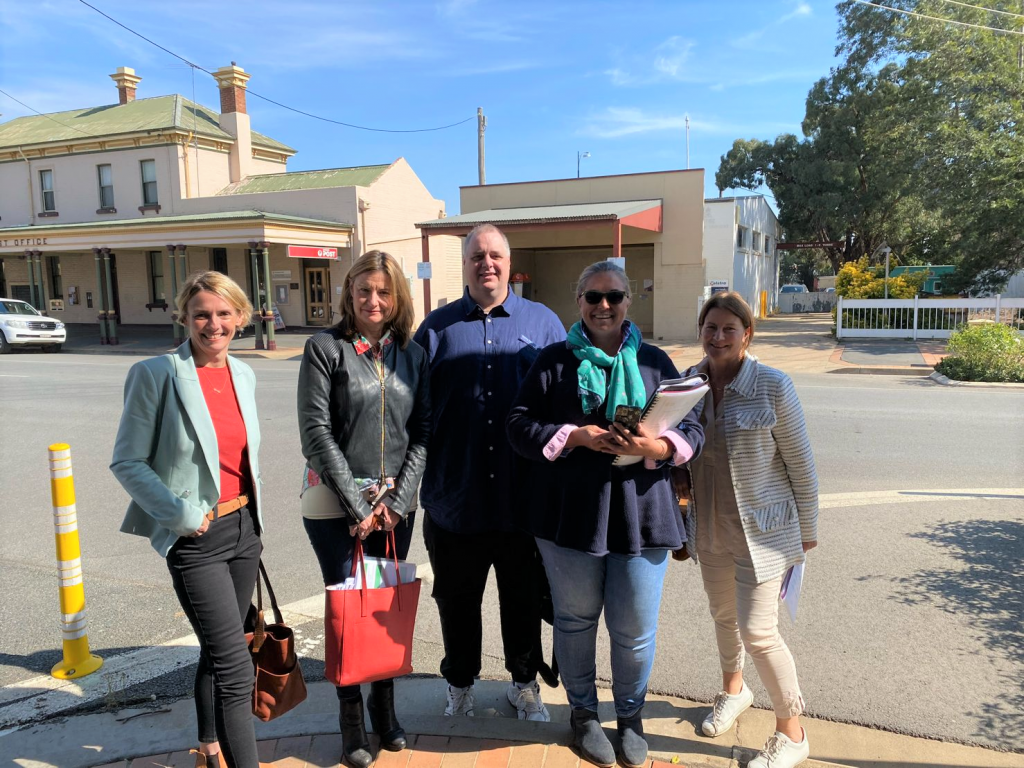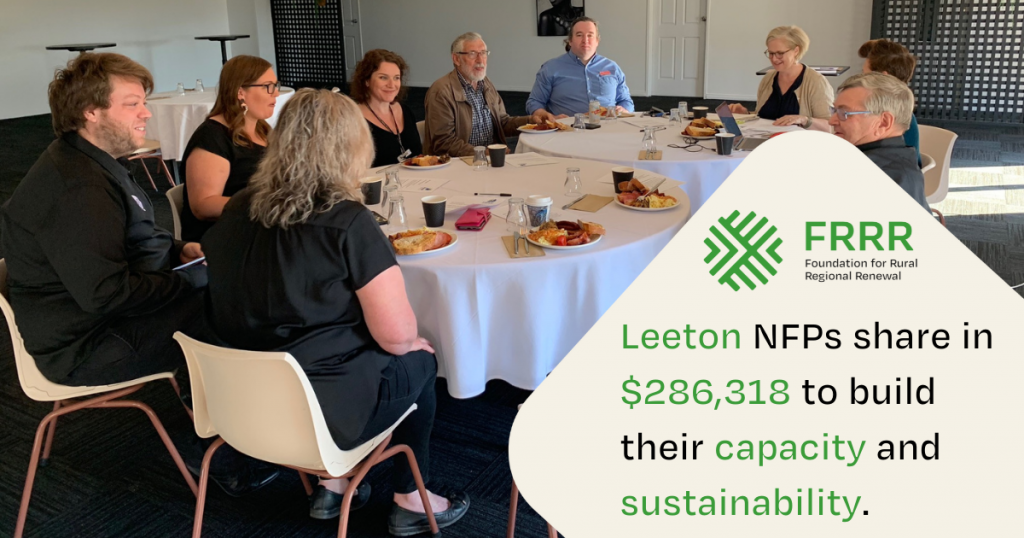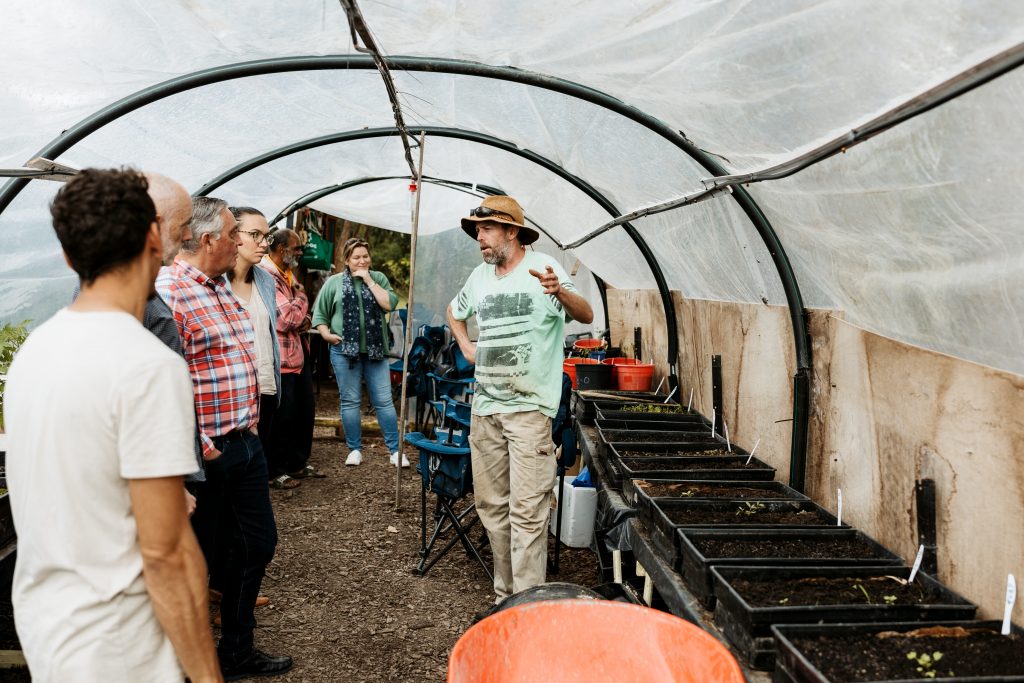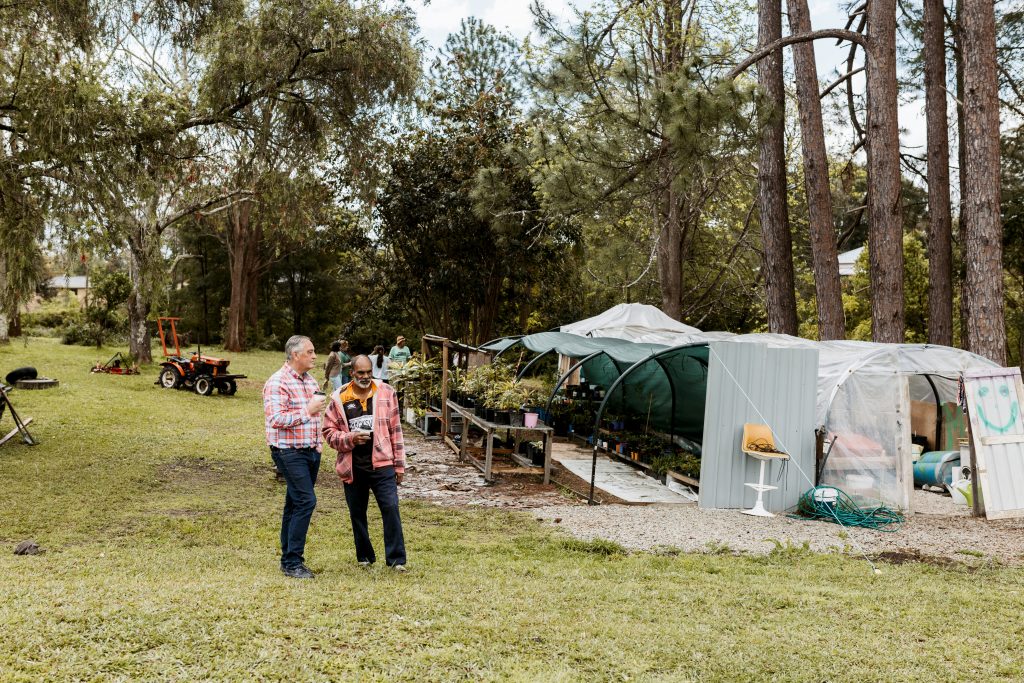Foundation for Rural & Regional Renewal (FRRR)
On Gumbaynggirr Country
The Nambucca Valley in NSW was one of the first participating communities in the Investing in Rural Community Futures Program, which FRRR has been running with the support of VFFF since 2019. The program aims to help local not-for-profit organisations build their capacity so that they can better support the communities they serve.
One such group is Mujaay Ganma Foundation, which was established in memory of two strong, proud Gumbaynggirr women – Mardi Walker, Mujaay and Florence Ballangarry, Ganma. The Foundation grew from the need to bring back cultural strength and trust to people and families who are dealing with cancer. But it’s grown to offer far more than that, supporting Aboriginal people and their families with culturally friendly, emotional, physical and spiritual support. Through culture and sustainable practices Mujaay Ganma also endeavours to support a healthy lifestyle in the modern Nambucca Valley.
One of Mujaay Ganma Foundation’s goals is to create the Yuraal Guunumba Ngurraay: Gumbaynggirr Native Foods Community Garden Project, which will improve the wellbeing of local Gumbaynggirr Country and community. The garden will be a space where Elders can share cultural values and pass on traditional knowledge and skills to younger generations. It will also encourage students and youth to learn about native forest and riverbank regeneration and ecosystems. There is also a plan to help young people learn the identification and properties of native plants needed for regeneration of degraded country, seed collection and propagation and nursery management skills. Ultimately, this will ensure the passing on of cultural knowledge from Elders and promote its value to the wider community. In addition, the hope is that the garden will help to connect young Gumbaynggirr people to Country, strengthen a sense of community and build the skills of local community members, leading to meaningful employment and freedom from welfare dependence, which contributes to community wellbeing. Importantly it will contribute to a healthy lifestyle, culturally, physically and collectively.
Ultimately the project aims to build the capacity of young Gumbaynggirr people, encouraging them to contribute to a more collaborative and cohesive community. This will be achieved by strengthening the passing on of cultural knowledge between Elders and the younger generations, strengthening pride in culture and in the identity of the young.
Furthermore, the wider Nambucca Valley community would have the opportunity to learn from the custodial people enabling more respectful appreciation for the original culture and abundant natural resources, so sustaining a healthy environment into the future.
However, with only being established in 2019, the organisation recognised that it needed to build its capacity before it could embark on such an ambitious project. By training local Gumbaynggirr coordinators, the project will support community leadership. These trainees could become well versed in project management and able to constructively give back to community in the future. These trainee project coordinators could learn these contemporary skills through being mentored by experienced project managers, learning how to negotiate resources, funds and engaging with other organisations by working with their mentors, learning ‘on the job’, at the same time as being supported in their culture by the custodial Elders of Country. This approach was chosen, as successful learning experiences for community people have involved learning while observing and engaging in doing.
This fit well into the priorities of the IRCF program, which included people, strategy systems and structure and sector efficiencies. They therefore applied to FRRR for a grant to enable them to hire and mentor two Gumbaynggirr people as trainees, who could then take on management of all the complex logistics involved in implementing the Yuraal Guunumba Ngurraay garden project. This was also an opportunity to help ensure that young Gumbaynggirr people are safe, connected to Country and have meaningful work.
With the support of a $38,443 FRRR IRCF grant, funded by VFFF, two trainee project coordinators were recruited and have been learning on the job. Their work has included:
- learning about workplace expectations and creating a culturally safe working environment;
- strengthening their connection to Country and culture, with Elders taking them on Country and experiencing ceremony;
- setting up systems and administrative work, including writing policies and keeping records of the planning and implementation of the many components of this complex project;
- creating a food garden under guidance of a horticultural mentor with experience working in the Aboriginal community at Miimi Aboriginal Corporation, where they learnt about garden preparation, irrigation, planting seeds and transplanting seedlings in preparation for establishing the Yuraal Garden;
- learning about caring for Country from a Traditional Custodian with land management skills; and
- managing a successful Golf and Bowls Day fundraising event, which was successful not just in raising money but in creating an event where community could come together, learn more about Mujaay Ganma Foundation and have a good healthy time together.
The training of the coordinators and the future establishment of the Garden is highly collaborative and involved several community organisations, including:
- Miimi Aboriginal Corporation, who provided continual support of resources and consultation;
- Earth Trust and Yarranbella, with support from Miimi, who mentored the trainee coordinators as they learnt to negotiate and navigate between Aboriginal and non-Aboriginal systems, between organisations and students and teachers;
- Bowraville Innovative Social Enterprise Precinct (BISEP) who helped them negotiate Western institutions and regulations;
- Muurrbay Aboriginal Language and Culture Co-operative who provided continual support of resources and consultation, in particular around language and culture;
- Gagu Land Services will took participants onto Country to help learn about caring for Country and land regeneration;
- Yarranbella Environment Services who provided the horticulturist and registered teacher, who will help develop the training package needed for the garden to be created; and
- Nambucca Valley Council who provided land for where the garden project will occur.
The Foundation was able to leverage the grant to secure wage subsidies and additional funding that meant the trainees have, with guidance, developed job descriptions, run recruitment information sessions, established a viable workplace for new recruits and learnt to supervise new staff.
Janette Blainey, Project Manager says they are proud to still be operating and to have succeeded in expanding.
“This grant we received under FRRR’s IRCF funding gave us the support and improved capacity to successfully apply for a further grant to establish a Native Seedbank and to train other young Gumbaynggirr people in custodial land management.
“While we still face challenges from the impacts of dispossession, racism and continuing colonising attitudes within the community, Mujaay Ganma Foundation has become stronger and better able to contribute more to the community. Our young trainee coordinators are growing in confidence and have pride in their culture and community, and are learning more about their culture and their Country. They are ready to step up when needed. Other young people have acquired knowledge, skills and a positive attitude to gardening an extensive food producing garden for the community to access. We also have two employees who are gaining project coordination skills. It’s also great to see improved relationships between Elders and younger community members.”
For more inspiring stories like this, head to our FY 2021/22 Annual Review.
A rural NSW grantseeker is proving that philanthropic investment in people and skills can produce a huge return on investment – bringing in more than $2.4million in grants for his community.

While many Government and philanthropic funders won’t give grants for funding people or capacity building, Junee Business and Trades Community Liaison Officer Nicholas Pyers is showing such investments can pay large dividends.
Nicholas’s role has been funded since 2019 by The Foundation for Rural & Regional Renewal (FRRR)’s Investing in Rural Community Futures program. He has been successful in helping win and advise on grants totalling $2,483,226 – and is awaiting news on a further $1million of grants that are in progress for Junee, which is located 440km south-west of Sydney in the Riverina region.
FRRR CEO Natalie Egleton said that since late 2018, regional NSW communities have faced a series of unrelenting disruptions, with drought, bushfire, flood and the COVID-19 pandemic continuing into 2022.
“The impact on these NFP organisations has been significant. It has taken its toll on the people that lead and run these organisations and has increased their load and affected their wellbeing. The sector has been dealing with extreme fatigue, burnout, limited fundraising options, access to volunteers, disconnection and, in some instances wholesale organisational change.
“The funding of Nicholas and the grant support role is a great example of how investing in local jobs and paying someone who has skills can result in high-yielding results and impact for organisations and communities,” she said. “This gives weight to our practise of employing local people and leveraging their position to help build the capacity of the entire town or community,” Ms Egleton said.
The impressive tally has been reached by a combination of activities. The grants have been won either by Nicholas directly developing a project concept and budget, then writing and submitting the grant application, or him reviewing other grant applications that have been submitted, as well as him identifying grant opportunities for other groups so they are able to apply. Nicholas also provides support to individuals in organisations, building their capacity and knowledge of grant writing, which allows them to prepare and submit grants, and secure funding for their own organisations.
FRRR’s Investing in Rural Community Futures (IRCF) model was developed in partnership with Vincent Fairfax Family Foundation (VFFF) and aims to strengthen local not-for-profit (NFP) organisations and, ultimately, enable them to thrive. It is a grassroots approach designed to build and support the capacity of individual and collective NFPs, over a sustained period of time.
This program now operates in seven communities in NSW, delivering a blend of grants and capacity building activities supported by local facilitators. Junee, Leeton and the Nambucca Valley were the initial cohort of communities supported by the Vincent Fairfax Family Foundation. Supported by The Snow Foundation Nowra, Ulladulla & Batemans Bay started an IRCF program in 2020 and further investment by Bendigo and Adelaide Bank’s Community Enterprise Foundation saw Bay & Basin communities join in 2021.
Successful grants for the Junee community range from upgrades to sporting facilities and meeting rooms through to projects supporting the likes of a museum.
FRRR has awarded another $286,318 in grants to four Leeton not-for-profit organisations (NFPs), in partnership with the Vincent Fairfax Family Foundation (VFFF). These grants will continue to build the capacity and sustainability of NFPs in the Leeton area, allowing them to better support their community.

The grants are part of FRRR’s Investing in Rural Community Futures (IRCF) program – an ongoing multi-year program that works to strengthen the NFP sector and inter-organisational relationships in Leeton, helping the community to thrive and achieve long-term stability.
As part of the IRCF program, FRRR facilitated sessions with community groups to create Roadmaps to document the organisational needs that exist in the Leeton NFP community and how FRRR can support local NFPs to maximise opportunities for a stronger and sustainable NFP sector and community.
Nancy Sposato, IRCF Program Manager for Leeton, said that each of the four initiatives being funded meets a need outlined in the Leeton Roadmap.
“The applications we received confirmed what we saw in the results of the FRRR’s recent Heartbeat of Rural Australia study, which showed, overwhelmingly, that after nearly two years of constant disruptions, volunteers are fatigued. In fact, many organisations have lost their volunteers due to the impacts of COVID-19.
“This round of grants will see new and continued employment of people for Leeton NFPs, taking pressure off volunteers and allowing these organisations to continue building resilience and capacity and doing what they do best – providing vital support for their community.
“A real strength of the IRCF program is that it provides a framework for these local NFPs to collaborate and support one another while also playing to their individual strengths. We can see such a sense of community in this round of applications, with intention for almost all of the roles funded through these grant funds working from the Leeton Connect offices. This will give the broader sector much greater access to their capacity building services.
“We’re also pleased to be funding a Leeton Jumpstart Coordinator who will oversee mental health first aid training. This training will be delivered to the Leeton Jumpstart Fund assessors, as well as members of the wider NFP sector. It’s these kinds of inter-organisational initiatives that will have a widespread impact on the entire Leeton community,” said Ms Sposato.
The four funded initiatives are:
- Leeton Business Chamber – Leeton Community Digital Hub Initiative – Support the not-for-profit sector and develop, build and engage the community in a new Digital Hub for Leeton. $40,000
- Leeton Connect Inc – Leeton Continues to Connect – Build capacity of the not-for-profit sector across Leeton and develop a plan towards a secure future by continuing to employ the coordinator for Leeton Connect over a two-year period. $147,600
- Leeton Jumpstart Fund Incorporated – Leeton Jumpstart Coordinator – Build capacity in fundraising, marketing and the delivery of mental health first aid training for Jumpstart’s volunteer panel and other local NFPs dealing with crisis through the employment of a coordinator. $44,718
- Leeton Shire Council – Community Grants Support Coordinator – Help not-for-profits in Leeton apply for and strengthen their own capability to attract funding and resources by employing a Grants Support Officer. $54,000
In addition to Leeton, the IRCF program is also working in Junee and Nambucca Valley in partnership with the Vincent Fairfax Family Foundation, and in Nowra, Batemans Bay and Ulladulla with the support of The Snow Foundation, and in Bay & Basin in partnership with Bendigo Bank Community Enterprise Foundation.
For more information about the Investing in Rural Community Futures program visit – https://frrr.org.au/ircf-program/.



